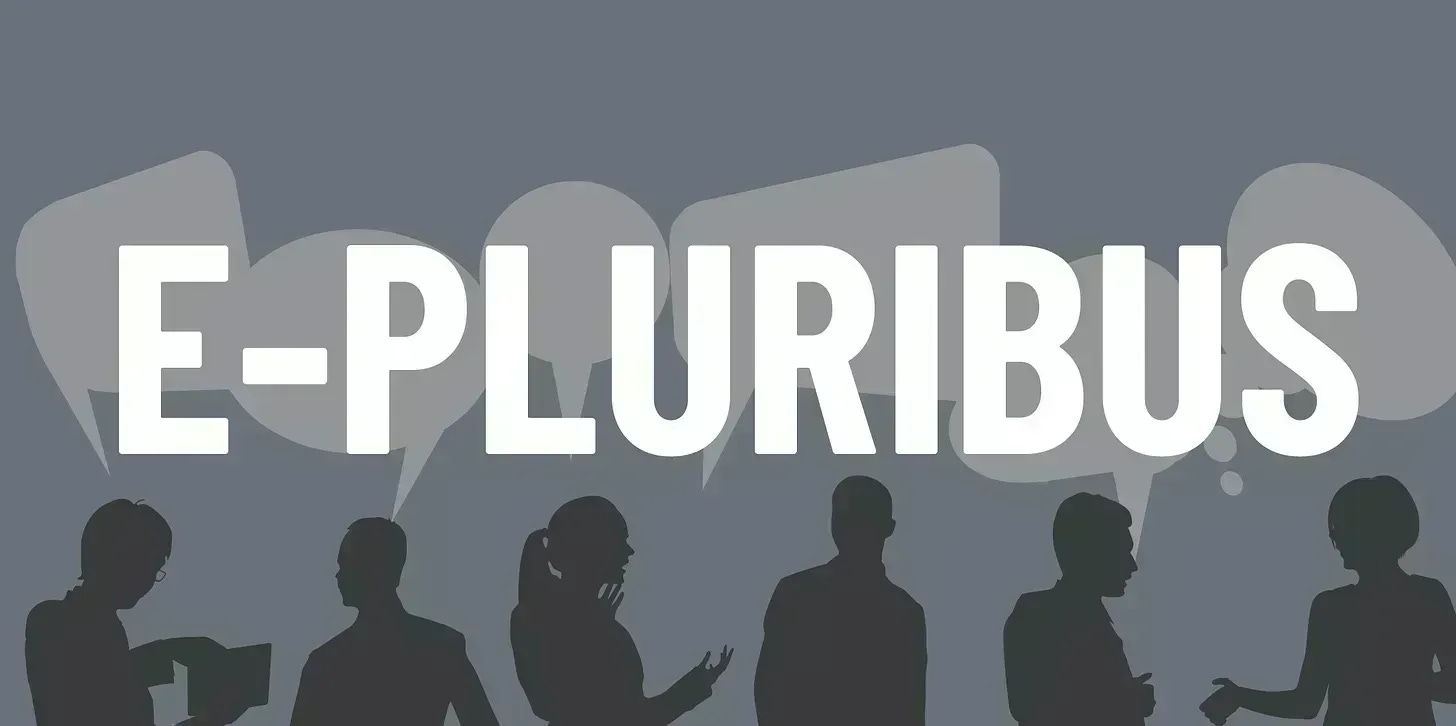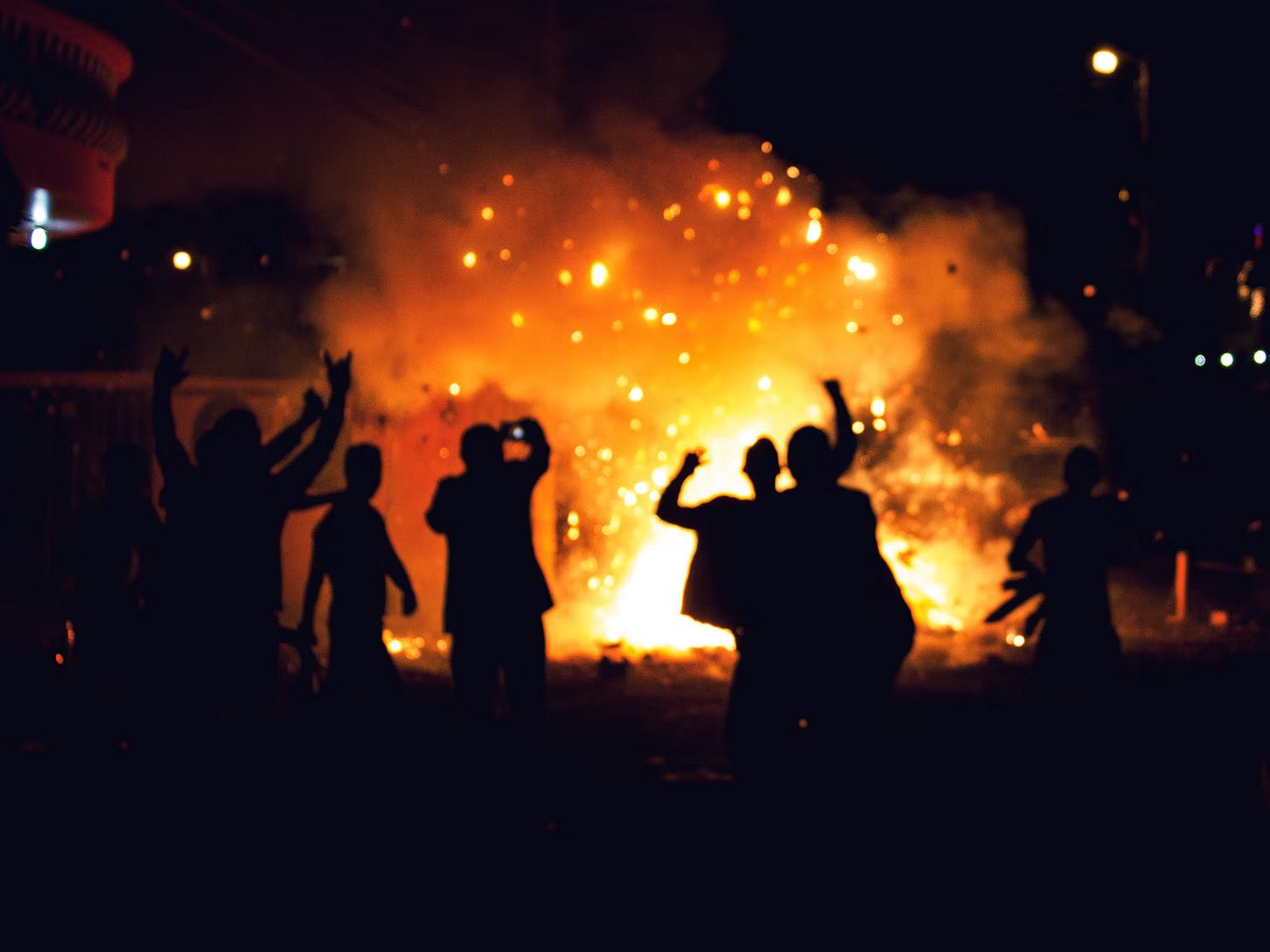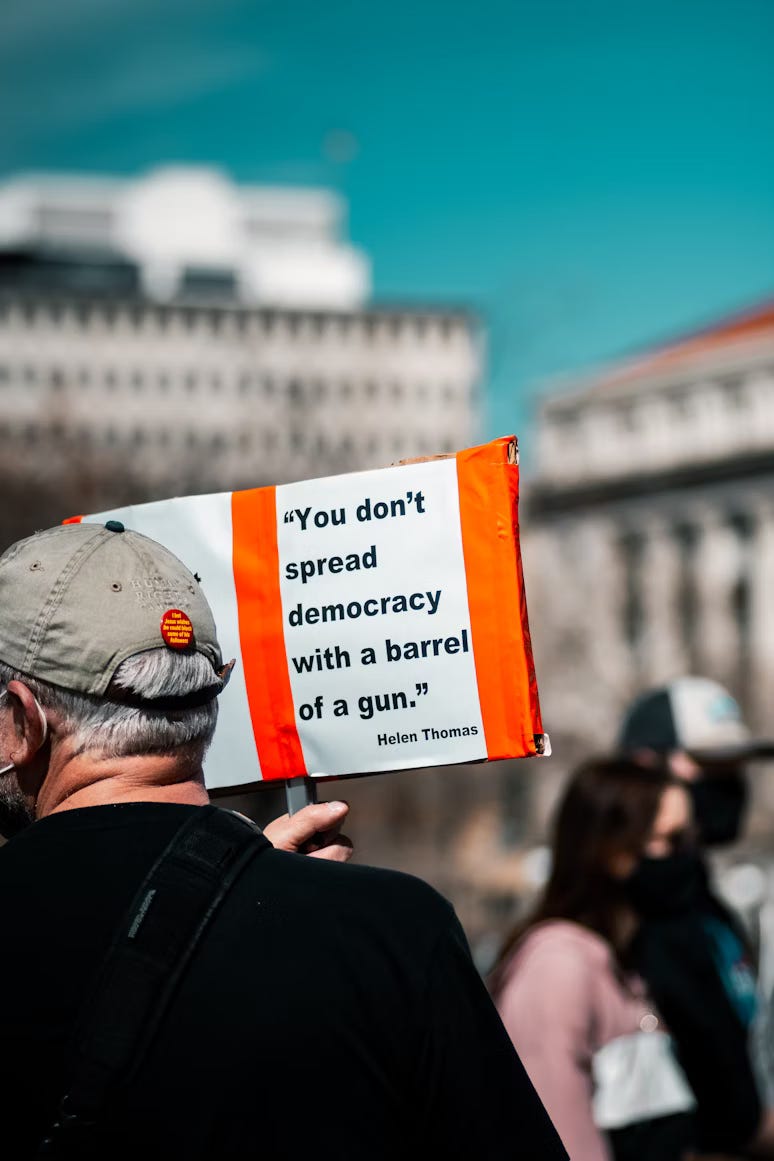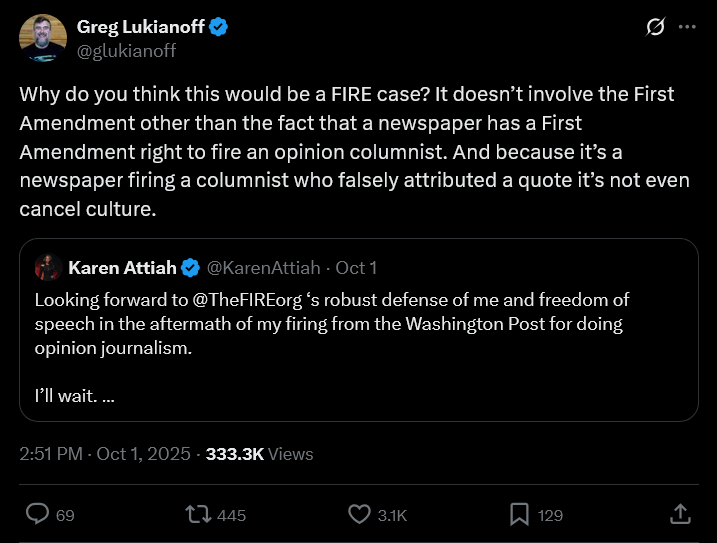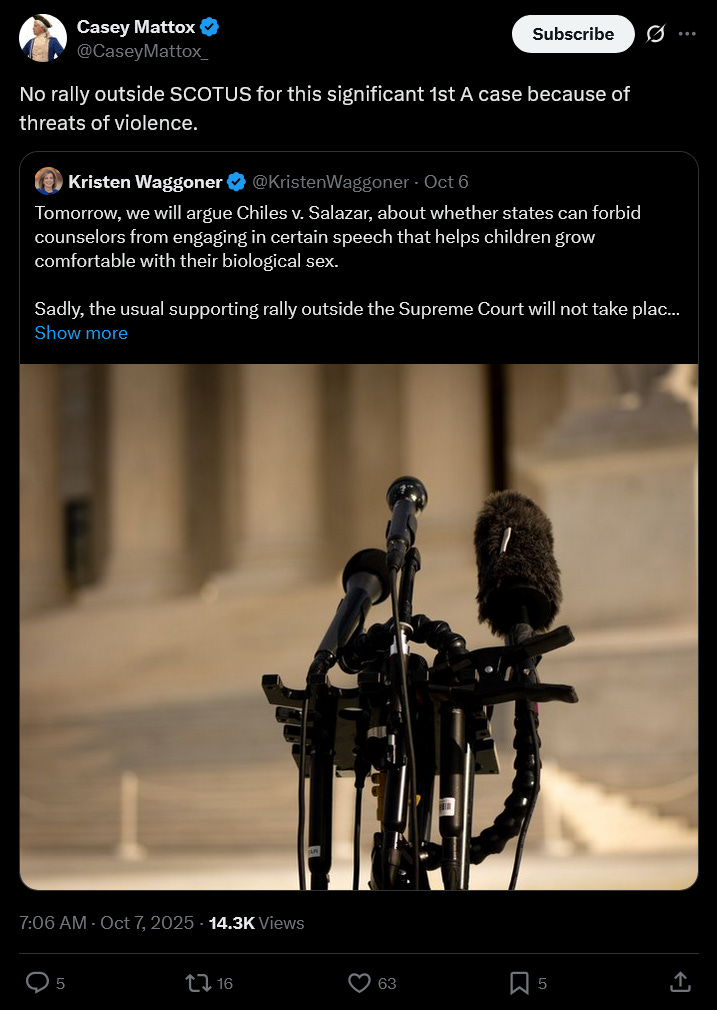E-Pluribus |October 8, 2025
TSA as a censorship tool. Political violence isn't a partisan problem. Democrats should champion free speech.
A round-up of the latest and best insight on the rise of illiberalism in the public discourse:
J.D. Tuccille: TSA Watchlists Were Used as Tools of Political Warfare
The federal government employs many tools to silence its political enemies. One of its most ingenious (and perhaps obnoxious) censorship implements: TSA watchlists. Reason reports that the Biden Administration made liberal (but quiet) use of the Transportation Security Administration to harass American travelers who engaged in speech the government found unhelpful:
On September 30, “the Department of Homeland Security (DHS) announced the results of an internal investigation uncovering widespread abuses committed by Biden administration officials, who weaponized the Transportation Security Administration (TSA) against innocent American citizens,” according to a TSA press release.
The Biden administration is accused of adding people who “resisted mask mandates on airplanes nearly six months after the CDC relaxed its indoor mask mandate” to watchlists that subjected them to extra security. It also watchlisted not just participants in the January 6, 2021 riot, but also those merely suspected of traveling to the Washington, D.C. area in sympathy with the protesters. “This targeted campaign of harassment continued through June 2021, six months after the events in question, despite no clear or immediate threat to aviation security.” (Emphasis in original.)
With regard to the specifics of those watchlist inclusions, Sen. Rand Paul (R–Ky.) released documents acquired by the Senate Homeland Security and Governmental Affairs Committee. The committee held a September 30 hearing on the “weaponization of the Quiet Skies program,” a TSA watchlist scheme terminated after it was found to have been abused for political purposes.
It’s been reported that former Rep. Tulsi Gabbard (D–Hawaii), now the Director of National Intelligence, was placed on the Quiet Skies watchlist. The Biden administration claimed her inclusion was, in part, because she attended a Vatican event organized by a suspicious European. But she and many others believe it was retaliation for her criticism of then-Vice President Kamala Harris. Journalist Matt Taibbi reports that Gabbard’s name was on the list alongside three unnamed Republican members of Congress who also offended the powers that be. But you didn’t have to have a high profile to get on a watchlist.
Pedro Gonzales: The Poison in America’s Heart
The most popular theory of political violence teaches that some young people commit horrific acts of terrorism because they’re swept up by the most radical elements of either right- or left-wing ideology. At Chronicles, Pedro Gonzales says this analysis is incomplete. Tyler Robinson certainly killed Charlie Kirk because he gave up on free speech and liberalism, but there’s something more nefarious going on under the surface:
As best as anyone can tell, Robinson [Charlie Kirk’s killer] appears to have been pushed toward the leftmost part of the political spectrum through the … internet, its group chats, and dark online subcultures. Robinson adorned bullet casings with what look like anti-fascist slogans and references to video games and memes.
…
I think that the political model for understanding these shootings is outdated and incomplete. Not all these networks are what you would expect, and the radicalization of these young killers isn’t as simple as adhering to an extreme left- or right-wing ideological catechism.
…
I realize I’m articulating what is probably the least popular position to take at a moment when the left and right are gearing up for war. But it’s true. Ideological violence, whether it expresses itself as left- or right-wing, is just a symptom, a body floating on the surface of the water. There is something deeply sinister happening to young people, and it is primarily taking place on the astral plane that is the internet, where souls are changed.
In the aftermath of Kirk’s assassination, people on the right worked to get anyone who said anything insensitive about him fired. A few months ago, some of the same voices in this ongoing effort mocked a 17-year-old left-wing X user who committed suicide by jumping off a bridge.If shadowy networks are radicalizing people, it’s because the door has already been opened. We’re living in a world where death and suffering are a joke, a source of entertainment, an opportunity to land a final, unanswerable barb. Open your phone and you can watch a man be killed in front of his family, then scroll on to posts about food or pornography. The human brain was not designed for this. Neither was the soul.
There is no political solution for what is plaguing America and stalking our kids. Whatever redress there might be begins at the level of the individual, in our hearts and in our heads. I suspect things will get even worse before people realize what’s happening.
Jay Caspian Kang: Can the Democrats Take Free Speech Back from the Right?
Historically the party of the underdog, Democrats must reclaim the mantle of free speech from Republicans, who have framed the left as a coalition of jackbooted thugs who punish even the slightest objection to their platform. So argues Jay Caspian Kang at the New Yorker. While he doubts the party has the stomach for a free-speech insurgency, Kang says defending pro-Palestinian protestors is a good launch point for the campaign:
I am a free-speech absolutist—an admittedly mostly useless and conditional term that tends to fall apart at the gentlest touch. What it means, in my case, is that I believe that all forms of nonviolent speech should be protected; that the government should not have any power to regulate media outlets, individual speakers, or online platforms; and that, on a broader, nonlegal, and even spiritual level, people should regard any type of censorship, even when done by private actors operating within their rights, with skepticism and worry.
I’m convinced that most Americans agree with this view, at least in theory, and one of the arguments that I’ve made during the past few years is that the Democratic Party and people on the left should return to their historical position as the defenders of the First Amendment, not only because it’s the right thing to do—and utterly essential in a moment when the Trump Administration seems to be gearing up for a crackdown on dissent in the government, the media, and the academy—but also because it’s one of those things, like football and underdog stories, that fill Americans with warm, familiar feelings.
…
The liberal side of American politics has, in the past few decades, essentially ceded the cause of free speech to the right. Pick any losing battle you want: the debate about trigger warnings and safe spaces, which became popular on college campuses and elsewhere in the early twenty-tens; or the fights over deplatforming allegedly harmful speakers about ten years ago; or the shutting down of “disinformation” on social media during the early Biden Administration. These little acts of censorship had the net effect of helping people on the right make the case that they were and are having their speech suppressed.
…
If you believe that politics obeys a kind of thermodynamics, it would stand to reason that the Democrats, now expressing growing concerns over censorship … would be able to seize the mantle of free speech and build up a degree of activist energy …
But I don’t think this will happen. For one thing, the cultural shift that led to safe spaces and trigger warnings was more powerful than some of us may want to admit. It’s true that we are in the waning days of the concept that speech is violence—due in part to a marked algorithmic shift in social media, from peak woke to peak reactionary, as well as the plummeting faith the public has in the academy, the crucible for this idea.
…
For all its appeal as an abstract idea, free speech, as a cause, tends to require an emotional issue that is actually prompting censorship before it can unite people from different political tribes to rally under its banner. For the past two years, the subject that has done this more than any other has been the war in Gaza. Many Americans have been fired or had their free-speech rights violated because of their statements about the war—and this has created a tremendous insurrectionary energy on both the far right and the left.
…
A Democratic Party that was both in line with its constituency and committed to free speech would have protected pro-Palestinian speakers and loudly stood up to the Trump Administration’s efforts to defund Middle Eastern-studies departments at universities and to detain and deport activists. Some of the Administration’s actions, most notably the detention of the Columbia graduate Mahmoud Khalil, did garner a response from Democrats, but the noise came largely from the Party’s left—Alexandria Ocasio-Cortez, Rashida Tlaib, Ayanna Pressley—rather than from its establishment.
…
But people who had … supported what was broadly labelled “cancel culture” still occupy roles in the infrastructure of the Democratic Party, of major nonprofits, and of academia. It’s hard to imagine that the individuals who mostly rolled their eyes at free-speech claims just a few years ago will suddenly transform into Mario Savio-style culture warriors, urging their audiences to throw themselves onto the gears of government. These same people, for better or worse, are the gears.
Around X
Former Washington Post opinion columnist Karen Attiah was unceremoniously fired last month for misquoting Charlie Kirk after his assassination. She then publicly chastised the Foundation for Individual Rights and Expression (FIRE) for failing to defend her. FIRE president Greg Lukianoff wasn’t having it:
America has a fair-weather relationship with free speech, certainly. But are we more censorious than a theocracy like Saudi Arabia? Comedian Dave Chappelle seems to think so. Jeremiah Johnson says the funny man needs to have his head examined.
Yesterday the Supreme Court heard oral arguments in Chiles v. Salazar, a case challenging Colorado’s ban on so-called “conversion therapy.” A free speech rally in support of plaintiff Kaley Chiles was scheduled to occur before the proceedings, but was abruptly canceled due to credible threats of violence. The irony wasn’t lost on Casey Maddox.



